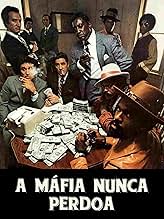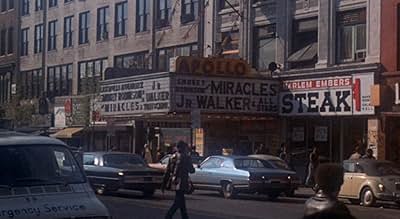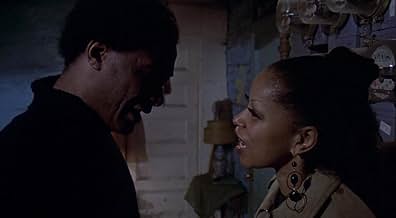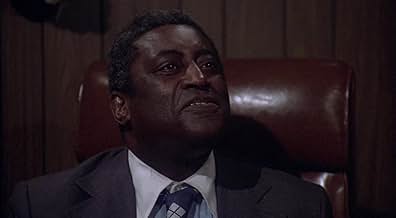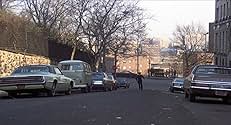IMDb RATING
7.0/10
7.4K
YOUR RATING
Two New York City cops go after amateur crooks who are trying to rip off the Mafia and start a gang war.Two New York City cops go after amateur crooks who are trying to rip off the Mafia and start a gang war.Two New York City cops go after amateur crooks who are trying to rip off the Mafia and start a gang war.
Joseph Attles
- Mr. Jessup
- (as Joe Attles)
Anthony C. Cannon
- Sal
- (as Anthony Cannon)
George DiCenzo
- Patrolman
- (as George Di Cenzo)
- Director
- Writers
- All cast & crew
- Production, box office & more at IMDbPro
Storyline
Did you know
- TriviaAlthough known primarily as a "blaxploitation" film, it holds many Neo Noir elements including police procedural (including Anthony Quinn as a slightly crooked cop with a good heart); poor sympathetic criminals stealing from unsympathetic rich criminals; and different factions of the mob and/or gangs.
- GoofsShortly into the movie while counting the money, two cops knock on the door. The tablecloth with the money is folded up and pushed to the floor. When the cops enter the room the tablecloth, money and briefcase are back on the table.
- Alternate versionsThe original UK cinema version was cut by the BBFC with edits made to nearly all the fight scenes and shots of beatings, and heavy cuts to shootings and a man on fire during the climax. All later releases were uncut.
- ConnectionsFeatured in Inside 'Live and Let Die' (1999)
Featured review
"Across 110th Street" was more than just a cliché (yet it was full of them), it was deep and developed (yet had a simplistic story about cops and criminals), it was gritty and honest (yet overly-so enough to make you gasp, not laugh), and it was pure, uncut, cinematic genius from beginning to the wildly unseen ending. There were plenty of pitfalls for "Across 110th Street" to fall into, but it continually saved itself by being genuine and dark throughout. While the editing, albeit pure 70s cinema, was completely tangent, the film itself demonstrated the raw force of truth, giving us a rare (yet fictional) story of the changing of the guard in Harlem, the truth of its streets, and the minds of its criminals.
Sounding like a scene right out of "Dead Presidents", our story begins with three African Americans stealing money from the mob, only to transform the simple robbery into a battleground, equipped with machine gun fire and plenty of cops caught in the line of fire. Needless to say, both sides the Italian mob who currently has a strong hold on the crime in Harlem as well as both the upcoming African American police Lieutenant (played by Yaphet Kotto) and the decaying corrupt Captain (played by Anthony Quinn) are ready to do whatever it takes to bring these men to justice. Our plot device suddenly becomes a ticking clock, with our minds in constant question as to who is going to get to the finish line first. What keeps this cliché device from sounding stale is director Barry Shear's ability to take us through each of the three story lines with nobody eating from the sweet cake of victory at any given time. "Across 110th Street" is not a comfortable story. The characters are flawed, the imagery is sandpaper rough, and the language is honest. Shear has made this film during a time where corruption is used to represent the mindset of the community. Harlem is not shown in a productive light, but then neither is the police nor the mob. What makes "Across 110th Street" feel like a science experiment is that you see the decay of the community implode systematically. From the simple thugs who begin the robbery, to the Italian mob who is just as brutal but with better suits, all the way to the police who use the same tactics, but are protected (supposedly) by a badge, this film explores the explosion of corruption in a bold new way that eliminates cliché, yet builds on honesty.
Shear's ability to build the story into the camera's frame is only the stepping stone of this film. The unrelenting ending could only have occurred with the power of the actors in front of the camera. Their work is simple, at times one could even call it amateurish, but Quinn and Kotto do a phenomenal job of keeping the story, and their characters, grounded at all times. Their beats could have been tightened, but their flaws build upon the chaos of this story. Their facial expressions alone are worth their weight in gold, especially Quinn's ending glare. As Quinn and Kotto were our leads for this film, what stands out is how similar they are to their flawed mobsters and criminals. With our lead mobsters racism coupled with our medial issues of our criminals, we see a blend between them all. While they are all different characters, Shear brings them all together with small similarities. For someone jumping into the middle of this film, one would have trouble guessing who were the "real" bad guys, the guys with the guns or the guys with the badges. That is the next layer of "Across 110th Street" that could be used in any film studies class across the nation. Not just the visuals of a time filled with racial disgust, but also the fact that the racial divide wasn't in just black and white. Harlem owns the police, yet they are there to uphold the law while perhaps not exactly like that in Harlem today one can see this happening throughout the world in modern society.
Finally, one cannot end a review of "Across 110th Street" without mentioning the music which was icing on the hypothetical cake. To me, the sounds captured the era, the chaos of the music coupled well with the violence happening on screen. The two blended perfectly together, giving us not just a taste of an explosive Harlem, but also the sounds that may have accompanied it. As a child of the 80s, I never was witness to this so to see it (albeit in a form of fiction) only helped to heighten the awareness of this era in NYC.
Overall, "Across 110th Street" was a violent, loud, and turbulent film that was laced with clichés that were forgotten by the next scene. One could easily watch this film on late-night television and never quite see the power behind Shear's camera, or Quinn's acting ability (that final scene still haunts me), or the challenging music that accompanied our visuals, but watching it on a bright and sunny Saturday, the excellence of this film comes full force. The acting was at a perfect pitch for this film, the corruption that Shear demonstrates from across three spectrums adds a level of honesty to a film that could have easily been lost by another director. "Across 110th Street" reminded me of early Scorsese work, the raw grittiness of the city, a city that Shear loved (he filmed in Harlem), coupled with the powerful imagery took me to "Mean Streets" and "Goodfellas", but not "The Departed". This is a cannon of a film, one that should be watched and retained for the sheer honesty of the work, while it is fiction it holds a bit of truth to the turbulence of the world.
Grade: ***** out of *****
Sounding like a scene right out of "Dead Presidents", our story begins with three African Americans stealing money from the mob, only to transform the simple robbery into a battleground, equipped with machine gun fire and plenty of cops caught in the line of fire. Needless to say, both sides the Italian mob who currently has a strong hold on the crime in Harlem as well as both the upcoming African American police Lieutenant (played by Yaphet Kotto) and the decaying corrupt Captain (played by Anthony Quinn) are ready to do whatever it takes to bring these men to justice. Our plot device suddenly becomes a ticking clock, with our minds in constant question as to who is going to get to the finish line first. What keeps this cliché device from sounding stale is director Barry Shear's ability to take us through each of the three story lines with nobody eating from the sweet cake of victory at any given time. "Across 110th Street" is not a comfortable story. The characters are flawed, the imagery is sandpaper rough, and the language is honest. Shear has made this film during a time where corruption is used to represent the mindset of the community. Harlem is not shown in a productive light, but then neither is the police nor the mob. What makes "Across 110th Street" feel like a science experiment is that you see the decay of the community implode systematically. From the simple thugs who begin the robbery, to the Italian mob who is just as brutal but with better suits, all the way to the police who use the same tactics, but are protected (supposedly) by a badge, this film explores the explosion of corruption in a bold new way that eliminates cliché, yet builds on honesty.
Shear's ability to build the story into the camera's frame is only the stepping stone of this film. The unrelenting ending could only have occurred with the power of the actors in front of the camera. Their work is simple, at times one could even call it amateurish, but Quinn and Kotto do a phenomenal job of keeping the story, and their characters, grounded at all times. Their beats could have been tightened, but their flaws build upon the chaos of this story. Their facial expressions alone are worth their weight in gold, especially Quinn's ending glare. As Quinn and Kotto were our leads for this film, what stands out is how similar they are to their flawed mobsters and criminals. With our lead mobsters racism coupled with our medial issues of our criminals, we see a blend between them all. While they are all different characters, Shear brings them all together with small similarities. For someone jumping into the middle of this film, one would have trouble guessing who were the "real" bad guys, the guys with the guns or the guys with the badges. That is the next layer of "Across 110th Street" that could be used in any film studies class across the nation. Not just the visuals of a time filled with racial disgust, but also the fact that the racial divide wasn't in just black and white. Harlem owns the police, yet they are there to uphold the law while perhaps not exactly like that in Harlem today one can see this happening throughout the world in modern society.
Finally, one cannot end a review of "Across 110th Street" without mentioning the music which was icing on the hypothetical cake. To me, the sounds captured the era, the chaos of the music coupled well with the violence happening on screen. The two blended perfectly together, giving us not just a taste of an explosive Harlem, but also the sounds that may have accompanied it. As a child of the 80s, I never was witness to this so to see it (albeit in a form of fiction) only helped to heighten the awareness of this era in NYC.
Overall, "Across 110th Street" was a violent, loud, and turbulent film that was laced with clichés that were forgotten by the next scene. One could easily watch this film on late-night television and never quite see the power behind Shear's camera, or Quinn's acting ability (that final scene still haunts me), or the challenging music that accompanied our visuals, but watching it on a bright and sunny Saturday, the excellence of this film comes full force. The acting was at a perfect pitch for this film, the corruption that Shear demonstrates from across three spectrums adds a level of honesty to a film that could have easily been lost by another director. "Across 110th Street" reminded me of early Scorsese work, the raw grittiness of the city, a city that Shear loved (he filmed in Harlem), coupled with the powerful imagery took me to "Mean Streets" and "Goodfellas", but not "The Departed". This is a cannon of a film, one that should be watched and retained for the sheer honesty of the work, while it is fiction it holds a bit of truth to the turbulence of the world.
Grade: ***** out of *****
- film-critic
- Aug 2, 2008
- Permalink
- How long is Across 110th Street?Powered by Alexa
Details
Box office
- Gross US & Canada
- $3,601,306
- Gross worldwide
- $10,000,000
- Runtime1 hour 42 minutes
- Sound mix
- Aspect ratio
- 1.85 : 1
Contribute to this page
Suggest an edit or add missing content



